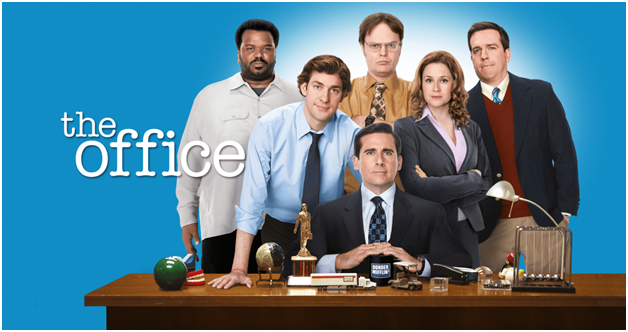|
Michael Scott: The Main Protagonist of the American TV Sitcom, “The Office”
In a past “Marketing Marvels” article, we talked about a hit TV series in 2007: Mad Men.
The show lasted for 7 seasons and ran from July 19, 2007 to May 17, 2015. It provided viewers a glimpse into the energetic world of advertising agencies in the 1960s in New York City.
We also talked about Don Draper, the main protagonist of the TV series. We discussed some business and marketing lessons we can learn from him, and how he was widely regarded as an advertising genius despite being erratic and mysterious at times.
The Office!

“The Office” was an American TV series that depicted the everyday work lives of employees at the fictional Dunder Mifflin Paper Company. It aired on NBC from March 24, 2005 to May 16, 2013, spanning a total of 9 seasons.
The show’s cast included actors and actresses Rainn Wilson, John Krasinski, Jenna Fischer, B.J. Novak, and Steve Carell, who played the role of the show’s main protagonist, Michael Scott.
Michael Scott: The Flawed Yet Lovable Regional Manager at Dunder Mifflin
As a fictional character, Scott did more than just entertain viewers. If you try watching or rewatching the TV sitcom, you’ll note several valuable lessons from his management style.
While most of the time he was a complete (yet lovable) mess, his experiences could still be used as sources of “wisdom” in the workplace. Throughout his tenure at Dunder Mifflin, he fostered genuine relationships with colleagues and customers, inspired people to dream BIG, and showed failure is just a pitstop on the way to success.
In other episodes, Scott was the epitome of what NOT to do too.
So, whether you’re in the process of starting your own business or strengthening your brand’s presence through marketing, you’ll find some insights in this show.
Get yourself a pen and Dunder Mifflin paper to jot down notes about a few business, marketing, and human relations lessons you can learn from Scott!
-
Appreciate your colleagues.
If there’s one thing Scott was good at throughout the sitcom’s 9-season run, it’s taking the time and effort to plan dinners, events, and parties for his team. He even had the annual “Dundie’s Awards,” where he would give out prizes to his teammates for the weirdest and funniest categories—whitest shoes, smelliest in the bathroom, best boss, etc.!
These clearly showed how much he valued and appreciated his colleagues.
Key takeaway: You don’t have to go as far as having your own “Dundie’s Awards.” A nice token of appreciation for your teammates or even acknowledging their achievements is a great way to show how much you value their efforts in the office.
As you do these, you’ll not only foster a healthy work environment but also encourage your colleagues to constantly do better and contribute to your firm’s overall performance.
-
Be a “people” person.
There were many times in the series when Scott overstepped his boundaries, but it never happened when he was doing business. In terms of making sales, he was always personable.
For instance: In the episode, “The Client,” Scott and Jan Levinson (played by Melora Hardin) met a client who’s in charge of the government papers of the entire Scranton county in Pennsylvania.
During their meeting at a Chili’s restaurant, Scott’s friendly approach to making a cold sale worked better than Levinson’s formal, let’s-get-down-to-business approach.
Key takeaway: Always make an extra effort to initiate small talks, establish rapport, and make yourself likable to your clients or customers. These will make a difference in how you interact with them and compel them to act on your call-to-action.
-
Never assume you completely know your audience.
In the episode, “The Convict,” Scott discovered an employee named Martin Nash (played by Wayne Wilderson) is an ex-convict. Frustrated that Nash’s stories about life in prison sounded better than stories about working in the office, Scott transformed into “Prison Mike” to scare his team.
However, due to lack of actual prison experience or any reliable research, he didn’t quite get his facts straight. The result?
Scott lost his credibility as “Prison Mike” and his audience, including an actual ex-convict, didn’t take his message seriously!
Key takeaway: Some businesses make the mistake of assuming they know a lot about their target market without actually confirming any of their beliefs. This is risky, especially because both buying patterns and preferences can change with time.
Relying solely on your own assumptions about your customers can result in misinformed decision-making and flawed strategy.
Avoid this by doing the proper target market research and reaching out to your customers. You’ll be surprised at what you’ll learn and how much valuable feedback they’ll be happy to share with you!
-
Treat your customers as KING or QUEEN.
In running a successful business, customer service is everything! Scott has lived by this principle all his life as Dunder Mifflin’s regional manager. He constantly took note of things to remember to bring out during his next meeting with his clients to make them feel important.
He also made sure to ask his clients about their family and start conversations with them at the start of the meeting. In other words, Scott treated them as people first and business second.
Key takeaway: It’s important to know and understand your clients, and make your business work well for them. Let them feel that you see them as human beings too, and not just people you can generate profits from.
-
Avoid being too “pushy” in marketing your offerings.
In the episode, “Mafia,” Scott and his colleagues Dwight Schrute (played by Rainn Wilson) and Andy Bernard (played by Ed Helms) met with an insurance salesman.
When the salesman became too pushy in soliciting business, Scott was convinced that person was a mobster. Schrute and Bernard went all-in with Scott in an effort to uncover the truth about the salesman’s identity.
Key takeaway: Avoid being too pushy in your approach to marketing and sales because you risk putting your brand in a bad light and scaring away qualified leads. Instead, take an educational, inbound approach so you can warm up your leads and get more sales.
—
The entertainment scene can provide us with a lot more than just laughs or heartwarming scenarios. “The Office,” particularly Scott’s character, has become well-known due to the lessons industry professionals can learn from him and the TV series in general.
… and while Scott may not be the most effective manager, he possesses the skills of a great marketer and provides viewers with great sales tips in every episode.
Remember:
- Appreciate your colleagues.
- Be a “people” person.
- Never assume you completely know your audience.
- Treat customers as KING or QUEEN.
- Avoid being too “pushy” in marketing your offerings.
These tips will not only work in “The Office’s” fictional setup, but also in your real work environment as a business owner, leader, marketer, manager, copywriter, etc.
Follow us on LinkedIn.
|


